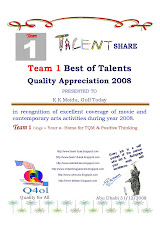Eleven films representing the best of contemporary international cinema focused on the Arab world will screen at seventh Dubai International Film Festival [Dec 12-19], providing a typical look at some of the issues and subjects that absorb the Arab world.
The Festival’s Arabian Nights segment of this year includes dramas, comedies, musicals and thrillers by international directors depicting slices of life in Iraq, Iran, Syria, Egypt, Turkey, Palestine, Algeria and Mauritania. They include two world premieres, one international premiere, six that are new to the Middle East and two new to the Gulf region; and a host of unusual collaborations.
Set in Iraq but made in Italy, 20 Cigarettes is the story of one man’s journey back from the brink of death. The film pivots on a 2003 suicide bomb attack on a police station in Nasiriyah.
Two documentaries look at the cathartic power of cinema. Made in the Netherlands, Baghdad Film School is the true story of Iraqi-born filmmakers Maysoon Pachachi and Kasim Abid, who decided to open the first independent film school in Iraq only a few months after its liberation.
Farther north in Iraqi Kurdistan, British filmmaker Mark Cousins discovers that despite being a thriving community, the people of Goptapa are still haunted by Saddam Hussein’s genocidal massacres. While trying to capture the village’s collective memories of war, Cousins manages to tap the fertile imaginations of its children. His documentary, The First Movie, documents the children’s joy and excitement as they encounter cinema for the first time and then start to create their own short stories.
Bullet Time |
Also set in Iraqi Kurdistan, Bullet Time tells the story of two humanitarian workers who brave curfew to save their interpreter's son, wounded by a landmine.
The Flowers of Kirkuk, probably one of the first Italian-Iraqi film collaborations to date, looks onto star-crossed lovers and doctors Najla and Sherko who know they can’t be together as one is Kurdish and the other from a prominent Arab family.
he City of the Dead |
In Cairo, director Sérgio Tréfaut’s The City of the Dead takes a closer look at the sprawl of ancient tombs, mausoleums, and crypts in the heart of the city. The area, dubbed ‘El Arafa’ (The Cemetery), by the locals, is also home to a community of nearly a million Cairenes living amongst the long-dead.
In Fragments of a Lost Palestine, filmmaker Norma Marcos tries to show her friend Stefan how normal people try to live normal lives outside of the occupation, and that there is a vibrant side of Palestine that exists outside of grim reports of violence and war.
Iranian director Taha Karimi sets his first, beautifully filmed, dramatic feature against the violent yet stunning backdrop of the Qandil mountains, where the borders of Turkey, Iran and Iraq meet. The Qandil Mountains, featuring veteran stage and screen actor Qotbeddin Sadeqi, attempts to draw the common concerns that link Arab with Kurd, Turkmen with Persian.
Antonia Carver, Consultant for DIFF’s Arab Programme, said: "These are incredibly diverse stories, yet the films are universal in their approach, focusing on individuals, families and communities, and touching on the extraordinary within these 'ordinary' situations. If we had to look for one constant, it would be the integrity and bravery of the filmmakers and their crews, who have made films in the most extreme of circumstances, with total humanity, making for such rich and compelling films."
Masoud Amralla Al Ali, Artistic Director of the Dubai International Film Festival, said: “The films in this year’s Arabian Nights programme have an entirely different approach. We’re seeing foreign films based in the region and starring Arabs and non-Arabs, Arab films starring celebrated stage actors, and Arab films made entirely outside the region. People are experimenting more, and the results are very worthwhile discoveries.”
Arabian Nights 2010 also includes Il Padre E Lo Straniero (The Father and the Foreigner) by Ricky Tognazzi, a suspenseful drama from top crime novelist Giancarlo De Cataldo involving a rich Syrian businessman based in Rome who finds himself accused of terrorism. The film, starring the Arab world’s Nadine Labaki and Amr Waked alongside Alessandro Gassman, follows a Roman bureaucrat with a handicapped son who strikes up a friendship with the businessman, also the father of a severely handicapped boy, which ends in a chase through the crowded streets of Rome.
Mohammed Soudani’s El Mektoub (Taxiphone), about a young Swiss couple whose truck breaks down halfway through the Algerian desert leaving them to come to terms with the surrounding community, is also a Middle East premiere.
Finally, Adrift: People of a Lesser God, is the story of an incredible odyssey made by multiple Pulitzer Prize-nominee undercover journalist Dominique Mollard as he sailed with 38 African migrants from Mauritania on a quest to reach Europe and a better life.







No comments:
Post a Comment